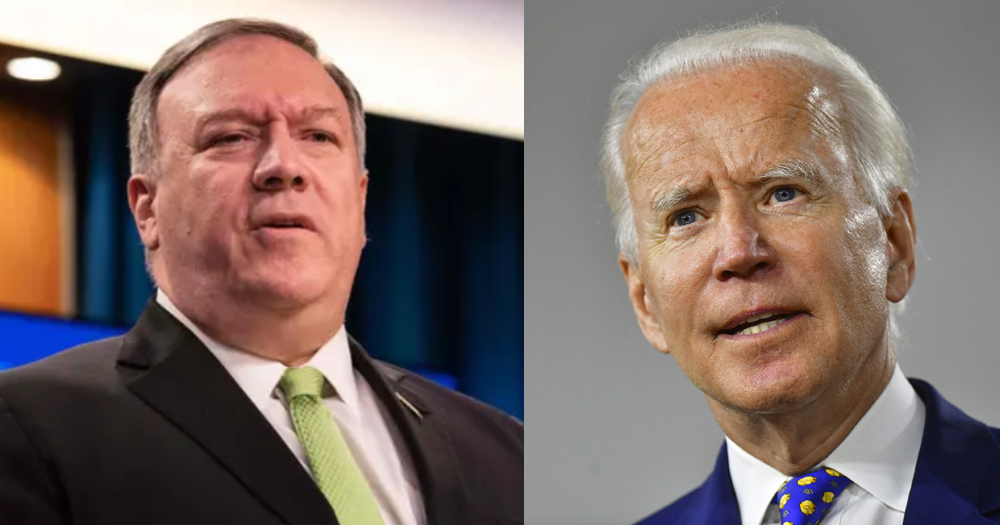China has slammed the latest move by the United States to lift diplomatic restrictions between American and Taiwanese officials, calling Mike Pompeo the "worst U.S. Secretary of State" in a commentary published by state-run media Xinhua on Sunday, Jan. 10.
Xinhua accused Pompeo of "seeking to maliciously inflict a long-standing scar on China-U.S. ties", instead of facilitating "an orderly transition with the next U.S. administration.
CGTN, the English-language arm of state-owned broadcaster CCTV, wrote that the Trump administration has "crossed a dangerous red line with China" days before U.S. President-elect Joe Biden takes office on Jan. 20.
It also called the move "a cowardly act of sabotage" for the incoming Biden administration.
Taiwan is a sensitive issue for Beijing, which considers the self-ruled island as one of its core interests that are non-negotiable.
Pompeo lifted self-imposed restrictions on contact with Taiwanese officials
Pompeo had earlier announced in a statement on Saturday, Jan. 9, that the U.S. is doing away with the decades-old restrictions over how American officials have contact with their Taiwanese counterparts.
Today, I am lifting all self-imposed restrictions on executive branch agencies’ interactions with their counterparts from Taiwan. This action will benefit both of our great democracies. https://t.co/JmxE5jsZYf
— Secretary Pompeo (@SecPompeo) January 9, 2021
Washington has imposed such restrictions on itself "in an attempt to appease the Communist regime in Beijing", but "no more", Pompeo, a known China hawk, wrote in the statement.
"Executive branch agencies should consider all 'contact guidelines' regarding relations with Taiwan... to be null and void," he said.
Such restrictions were placed after Washington adopted the One China policy in 1979 that recognised the Chinese Communist Party in Beijing, and not the Kuomintang that governed Taiwan.
The U.S. is still required to supply Taiwan with the means to defend itself under the Taiwan Relations Act.
Move meant to create chaos for incoming Biden administration
Bonnie Glaser, a senior advisor at Washington's Center for Strategic and International Studies, told CNBC that these restrictions included Taiwanese officials not being able to enter the State Department, and having to meet at hotels instead.
She added that the Biden administration is likely to disapprove of such a policy decision made in the last days of the Trump administration.
In a tweet, she also suggested that the move was meant to wreak chaos before the incumbent administration's departure.
If the Trump administration thought this was in the US national interest, why didn't they do it four years ago?
— Bonnie Glaser / 葛來儀 🇺🇦 (@BonnieGlaser) January 9, 2021
Experts the New York Times (NYT) talked to said the move was meant to be a trap for Biden, who now has to either undo the changes and look bad domestically as being soft on China, or not do anything and risk escalating tensions with Beijing.
China will voice its displeasure but will stop short of blowing issue up with Biden
Evan S. Medeiros, a professor of Chinese and East Asian policy at Georgetown University, told NYT that the move is likely "a publicity stunt" as it comes just days before the administration is set to step down.
And besides voicing its strong opposition to the move, China is unlikely to go beyond its rhetoric, he said.
"They will stop short of actually blowing up the relationship with an incoming administration until they see how Biden's going to approach it," he opined.
Taiwan welcomes move
Taiwan has lauded the move, with its Ministry of Foreign Affairs thanking the American State Department for its support.
I'm grateful to @SecPompeo & @StateDept for lifting restrictions unnecessarily limiting our engagements these past years. I'm also thankful for strong bipartisan support in Congress for the #Taiwan🇹🇼 Assurance Act, which advocates a review of prior guidelines. The closer ... 1/2 https://t.co/2UrT5d7Wws
— 外交部 Ministry of Foreign Affairs, ROC (Taiwan) 🇹🇼 (@MOFA_Taiwan) January 10, 2021
Taiwanese Foreign Minister Joseph Wu added that the partnership between the self-ruled island and and U.S. is "firmly based on [their] shared values, common interests and unshakable belief in freedom and democracy".
Taiwan's representative to the U.S., Hsiao Bi-khim, said the lifting of restrictions meant the removal of "decades of discrimination" against Taiwan.
Decades of discrimination, removed. A huge day in our bilateral relationship. I will cherish every opportunity. https://t.co/kR29OLLcFh
— Bi-khim Hsiao 蕭美琴 (@bikhim) January 9, 2021
Huge step in U.S.-Taiwan relations
The development appears to be the largest in a series of moves Washington has taken lately to forge closer ties with Taiwan amid increasingly fraught relations with Beijing.
U.S. ambassador to the United Nations (UN), Kelly Craft, is visiting Taiwan from Jan. 13 to 15, and will meet with Wu and Taiwanese President Tsai Ing-wen.
Craft has previously called for Taiwan's "full participation" at the UN, and is expected to give a speech on Taiwan's "impressive contributions to the global community", the U.S. mission to the UN said, Reuters reported.
China has opposed the visit, saying the U.S. would "pay a heavy price for its wrong action".
Previously in August, U.S. Secretary of Health and Human Services Alex Azar went to Taiwan as well. It was the highest-level visit by an American Cabinet official in decades.
China has voiced its unhappiness at such visits by stepping up its operations of bombers and fighter jets which made incursions into Taiwan's air defence identification zone (ADIZ).
The act was "a threat" to Taiwan's national security, Taiwan's Ministry of National Defence said.
Totally unrelated but follow and listen to our podcast here
Top image by Nicholas Kamm/AFP & Mark Makela via Getty Images
If you like what you read, follow us on Facebook, Instagram, Twitter and Telegram to get the latest updates.
